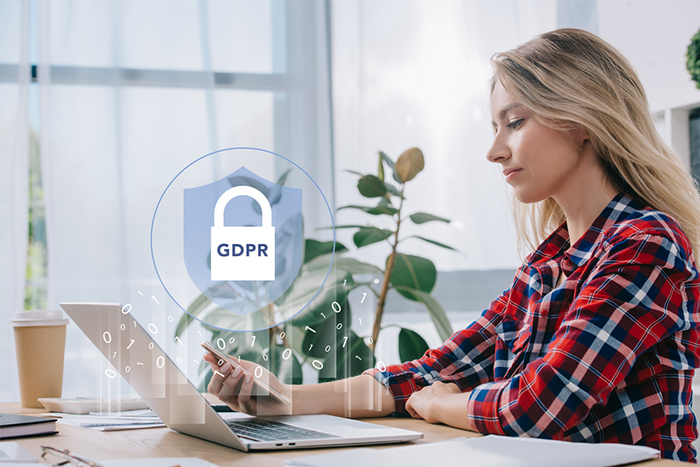Almost on every front of the news, be it online or on papers, one must have gone through the chaos running wild in customer data security, online privacy and misuse of data. Not even Facebook CEO Mark Zuckerberg was spared from this and was testified in front of the U.S. Senate due to the use of personal data on Facebook. This surely became the talk of the town and bought many companies on its feet.
With the continuous debate on data misuse and customer’s privacy, the demand to secure data was given top priority and government had to ensure steps to be taken on the arising rampant.
And finally, on 25th May 2018, European government passed a law to safeguard their citizens against data mismanagement, the ramifications. This law was called the General Data Protection Regulation (GDPR). Despite being officially classified on April 27, 2016, it couldn’t be enforced until May 25, 2018. This was due to a two-year transition period that was designed to help companies adjust to the new rules as per the regulatory.
The GDPR compliance regulation aims to strengthen the data protection and privacy for citizens of the European Union. However, it does affect the business outside EU. For instance, the data-collecting company may exist outside EU but their connection with each other lead to creating a proportional bond with each other.
To understand what exactly GDPR is, let’s go deep and have a thorough reading on the topic.

What is GDPR Compliance?
In the easiest language, GDPR empowers customers with total control over how their data is collected, processed and used further. The data could include any information like identified or identifiable natural person, further including birthday, address, phone number, salary, rent, IP address cookies collected by the browser.
Change with the Introduction of GDPR Compliance
There are many changes forced on e-commerce companies with the introduction of GDPR compliance. These changes are surely in the benefits arena of customers but if practiced well, this could also bring improvements in the workflow of the e-commerce business. Few of the changes with GDPR compliance are:
- Seek Customer’s Permission. Earlier, with no law on the data security of customers, users were not asked if they would like the website to collect their data. But now, it has become important to seek customer’s permission to collect and use their data.
If the customer chooses to opt out from sharing the data, there is nothing the website could do and obviously cannot store the data.
- Delete the Data. Many times, there are instances when customers have wanted sites to store their data so that it can be used next time. This is done so that customers do not waste time in filling out the details again for next time shopping experience.
But with the new GDPR compliance, it becomes mandatory for websites to delete the customer’s data after they are finished using it. They are not allowed to retain a customer’s data for an indefinite period.
GDPR for E-commerce Business

The business of e-commerce lies in providing customers with what they want. This is basically supported by the backend push of data providing companies. The tools that help in customer analysis for an e-commerce business is the power that marks the success of any e-commerce company. Such tools are efficient in gathering valuable data of the customers to plan campaigns like ads targeting, email marketing, product placement and many more.
With GDPR Compliance enforced, many e-commerce companies think that their business is in danger and might get doomed because of the data availability barrier. However, they fail to understand the fact that till the time, data is being used responsibly; there will be no harm in running the online business. Even customers promote it when they know that the power of their data lies in their hands.
Becoming GDPR compliant is extremely easy if you are not into any sneaky procedure of collecting data. There are few GDPR compliance checklists for e-commerce companies which need to be followed to be GDPR compliant. Any e-commerce company can run through the checklist to ensure that they are legally compliant and safe from the wrath of government and customers eventually.
Update Your Policy
The top task for E-commerce Company is to update its policy. It is important to keep every communication with consumers related to data be as transparent as possible. When there is nothing to hide, the procedure becomes even simpler. Few things to start could be:
- Review your return and refund policy
- Create an easy and hassle-free way to remove all customer data
- If being involved with other third-party tools, ensure that they are also GDPR compliant. Another tool could be:
- Email marketing platforms
- Online store providers
- Third-party mobile apps
Delegate DPO (Data Protection Officer)
The task to be GDPR complaint becomes easier with the involvement of leadership. Being one big task in itself, it would be great if you could allocate an officer who could keep a check on the compliance being followed in the company. A DPO would be responsible for overseeing data protection processes within the company making the task simpler.
Refurbish Data Management
When the point is all about data security, one more important thing to consider is revamping the data storage or record keeping. Since the customer can demand data anytime, it becomes stringent to be sure that the processes are cautiously recorded. The e-commerce company can go through Article 30, which covers a record-keeping procedure.
Be Legal Ready
Any e-commerce company can collect and use customers’ personal data only if they have been given the consent to do so. Hence it becomes important to be ready with legal objectives on collecting customers data. Multiple ways to get the consent of customers:
- Agreement
- Consent
- Legitimate Interest
Conclusion
The rules always build the community. It promotes the well-being of customers and the service or product providers. With GDPR Compliance in action, customers are empowered with data protection and e-commerce companies are authorized with using data appropriately. The two-way win for both is marking history in realizing the fact that without any breach and conspiracy, a business can run successfully keeping the interest of both parties beneficial and mutual.



